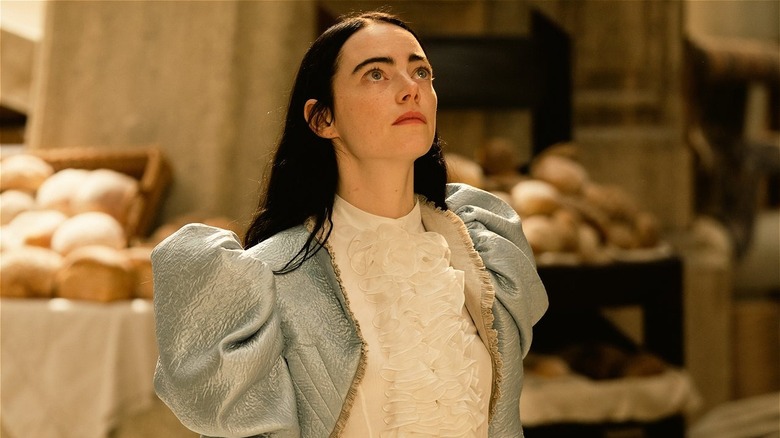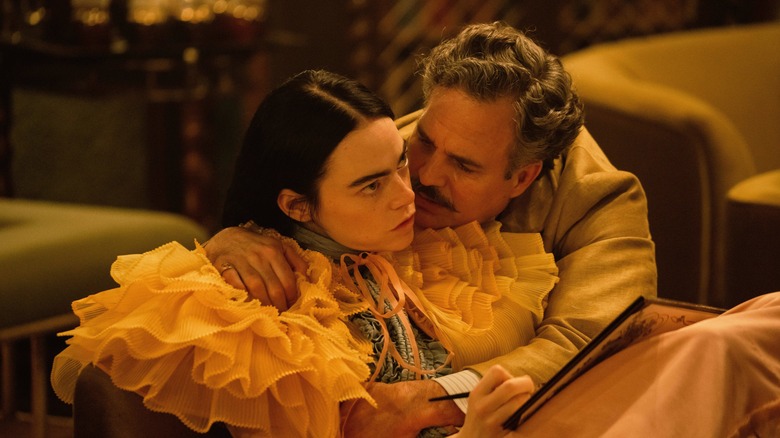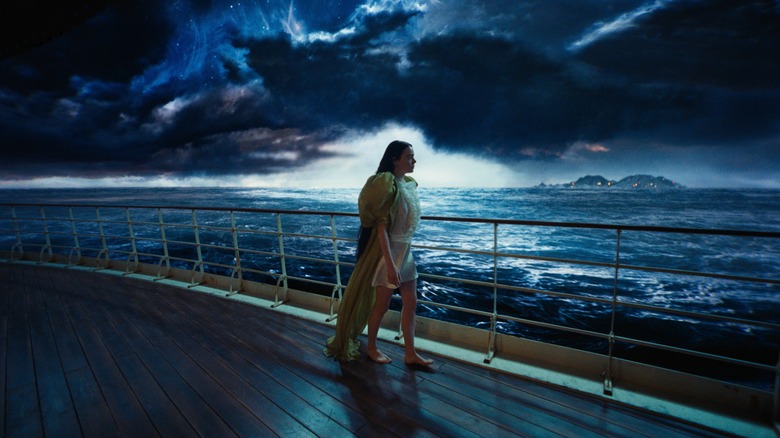Poor Things Review: Emma Stone Shines In A Feminist Take On Frankenstein
- Striking performances, especially from Emma Stone
- Gorgeous production and costume design
- Bella's political awakening is much less developed than her sexual awakening
In the latest collaboration between director Yorgos Lanthimos and actor Emma Stone, the two reach a deeper and more fluid understanding of each other, proving themselves to be one of the most significant creative duos of 21st-century cinema. Stone turns in a fearless performance in "Poor Things," building from the ground up an eccentric feminist take on Mary Shelley's "Frankenstein." Existing in a heightened reality filled with expressionist production design and a grandiose sense of style, "Poor Things" is as much a visual feast as it is an intellectual one. Bolstered by a motley crew of supporting actors, each given the freedom to be as bizarre as possible, it's a cinematic delight that charms on all fronts.
Bella Baxter (Emma Stone) lives in a quiet, forbidding English manor, where she is kept in near-isolation by her guardian, the strange but brilliant Dr. Godwin Baxter (Willem Dafoe). However, she is no ordinary gothic heroine. Bella is Godwin's creation (she calls him by the nickname "God"); he brought her to life and has been her parental figure and only companion. At the beginning of the film, she's struggling to master the basics of fine motor control and speech. But she learns rapidly, and the more information and life experience she acquires, the more she yearns to see the larger world.
While Bella becomes determined to have her own adventures on her own terms, she begins to realize that her desires are not necessarily aligned with polite society — and her innocent flouting of all restrictions is a thorn in the side of pretty much every man she encounters along the way. As she continually evolves, she grapples with what it means to be a human — more specifically, what it means to be a woman.
A dazzling ensemble cast
From top to bottom, "Poor Things" is a showcase of Emma Stone's considerable talents. Her embodiment of Bella — from the physical to the emotional — is one of her greatest achievements as a performer. She takes Bella through an incredible transformation, from a petulant child whose entire world is comprised of the manor in which she has "grown up" to an intelligent and perceptive woman determined to follow her own desires. Stone puts everything she has into this performance, and it's clear that she has comfort with and confidence in director Yorgos Lanthimos, allowing her to push herself to her absolute limits. The film wouldn't work without her in the central role, and it's difficult to think of another actress who could have brought her physicality, sense of humor, and emotional intelligence to the character.
She's hardly alone in this stellar ensemble cast, however. As the rakish Duncan Wedderburn, Mark Ruffalo has rarely been used better by a director, and "Poor Things" allows him to shine in a way that we haven't seen in quite some time. His performance subtly evolves throughout the film as a reflection of Bella's personal growth: he begins as a gentleman of the world responsible for Bella's sexual awakening, but as Bella becomes more intellectually sophisticated, his foolishness and stifling desire to conform to the status quo are exposed. Ruffalo is given permission to embrace a comedic pompousness that suits him incredibly well.
Likewise, Willem Dafoe as mad scientist-turned-father figure Godwin Baxter is at his best here, bringing a twisted sense of humor to the character's incredibly dark backstory. He references all of the cruel medical experiments inflicted on him by his father in the name of science so offhandedly that he consistently earns audiences' laughter. Even his exhalation of a single bubble after eating, a bizarre interpretation of the digestive system resulting from one of his father's experimental procedures, is molded into one of the film's most unexpected recurring sight gags.
Heightened reality in production design
The performances, as par for the course in a Yorgos Lanthimos film, are the driving force in "Poor Things," but the filmmaker has also outdone himself from an aesthetic perspective. The production design has a heightened sense of reality, with sets that are bigger, brighter, and more expressionistic than the real thing. The film's interpretation of Lisbon as Bella's first experience with the outside world is more about creating a feeling of freedom and possibility rather than a faithful recreation of the city. Each of the various locales featured in the film is lovingly rendered with playful creativity and endless imagination — they are, perhaps, how Bella sees the world more than how it actually is.
In creating a feminist retelling of "Frankenstein," Lanthimos captures the spirit of the classic story better than most adaptations. Bella's journey to understand both humanity and herself as an individual requires her to constantly readjust her perspective, as she — a recent creation — seeks logic and justice in an inherently illogical and unjust world. As she crafts her own identity, she is forced to confront not only what and who she wants to be (a heady question for anyone), but how that comes up against what society demands from her. "Poor Things" manages to succeed as both an intellectual exercise and a deeply emotive coming-of-age story, and credit goes to the endlessly fascinating collaborative efforts of Yorgos Lanthimos and Emma Stone.
"Poor Things" premieres in limited theaters on December 8, before expanding on December 22.


